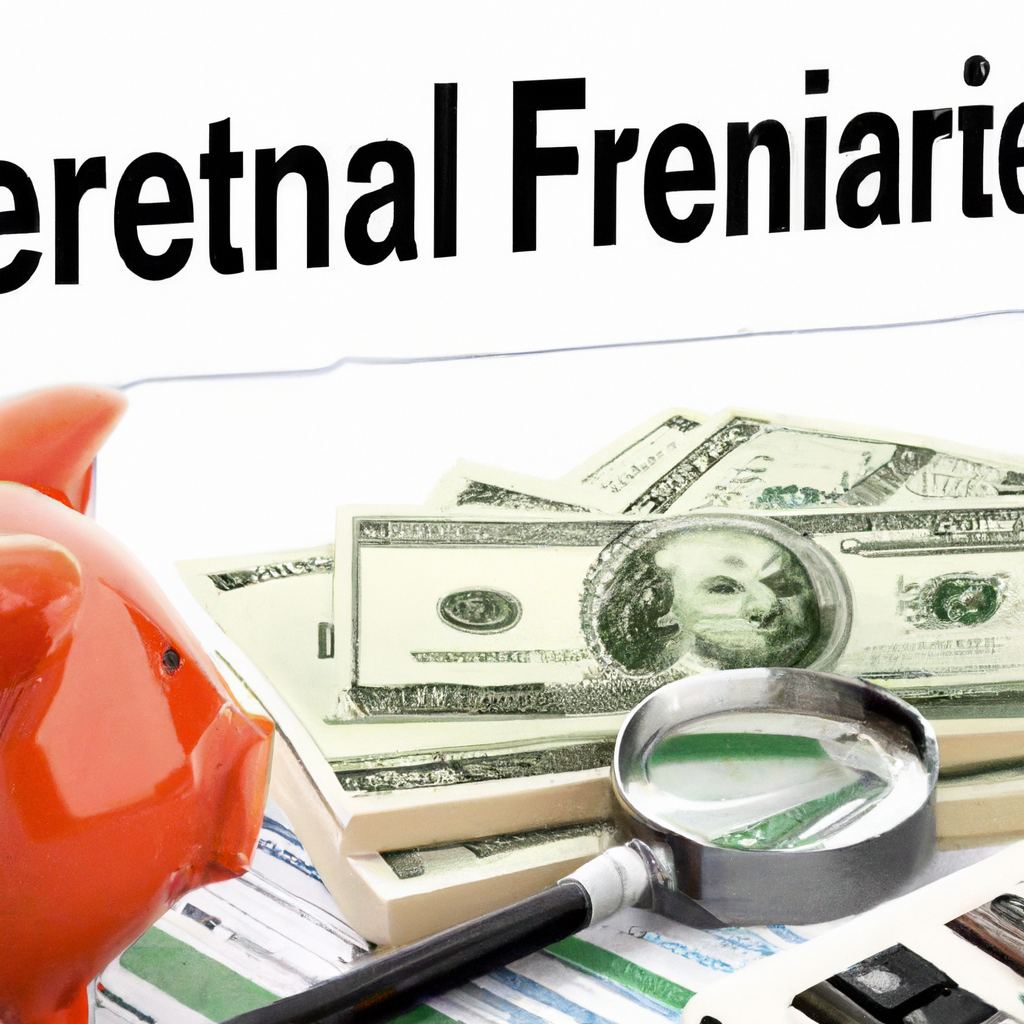Are you approaching retirement and wondering how to effectively manage your finances during this new chapter of life? Creating a retirement budget can be a crucial step in ensuring financial stability and peace of mind. In this article, we will explore practical tips and strategies to help you create a retirement budget that aligns with your goals and allows you to enjoy your well-deserved retirement years to the fullest.

Understanding Retirement Expenses
Retirement is a significant milestone in life, and planning for it is crucial to ensure financial stability during your golden years. One essential aspect of retirement planning is understanding your expenses. By determining your fixed expenses and identifying discretionary expenses, you can gain a clear understanding of how much income you will need to sustain your desired lifestyle.
Determining your fixed expenses
Fixed expenses are the regular and essential costs that you will incur during retirement. These include items such as housing, utilities, transportation, insurance premiums, and taxes. To calculate your fixed expenses, estimate the costs for each category and add them together. It is essential to be realistic and account for any potential increases in expenses over time. Knowing your fixed expenses will provide a solid foundation for creating your retirement budget.
Identifying discretionary expenses
Discretionary expenses, on the other hand, are the non-essential costs that you have more control over. These expenses can include entertainment, dining out, vacations, hobbies, and gifts. It is crucial to identify your discretionary expenses and determine how much you are willing to allocate towards them in your retirement budget. While these expenses may not be necessary for survival, it is essential to include them to maintain a fulfilling and enjoyable lifestyle during retirement.
Calculating Retirement Income
Once you have a clear understanding of your expenses, the next step is to calculate your retirement income. Doing so will allow you to determine if you have enough funds to cover your expenses or if adjustments need to be made.
Evaluate pension and Social Security benefits
An essential source of retirement income is often pension and Social Security benefits. Take the time to understand and evaluate the amount you will receive from these sources. Social Security provides a reliable income stream, but it is crucial to note that the longer you wait to claim benefits, the higher the amount will be. By assessing your pension and Social Security benefits, you can have a clearer picture of your monthly cash flow during retirement.
Assess investment income
Another potential source of retirement income is through your investments. Evaluate the returns you expect to receive from your investment portfolio, such as stocks, bonds, and real estate. It is vital to be realistic in your expectations, considering factors such as market volatility and risk tolerance. By assessing your investment income, you can determine the amount of wealth you will generate during retirement.
Consider part-time employment income
If you are considering working part-time during retirement, include the income you expect to earn in your calculations. Part-time employment can supplement your retirement income, allowing you to cover any shortfall or fund additional discretionary expenses. Be sure to consider the impact of working on your Social Security benefits, as earnings may affect the amount you receive.
Tracking Current Spending Habits
To accurately budget for retirement, it is essential to understand your current spending habits. By analyzing your monthly expenses and tracking irregular or one-time expenses, you can have a realistic understanding of your financial situation.
Analyze monthly expenses
Start by reviewing your bank statements, credit card bills, and receipts to identify your monthly expenses. Categorize them into different areas such as housing, food, transportation, healthcare, and entertainment. This will help you identify any areas where you can potentially cut back on spending during retirement. Analyzing your monthly expenses will provide valuable insights into your spending patterns and allow you to make informed decisions when creating your retirement budget.
Track irregular or one-time expenses
In addition to your regular monthly expenses, it is crucial to account for irregular or one-time expenses. These can include annual insurance premiums, property taxes, vehicle maintenance, and home repairs. By tracking these expenses over a year, you can estimate the average amount you spend on these items. Including these costs in your retirement budget will ensure you have funds set aside to cover these unpredictable expenses.

Estimating Future Expenses
While tracking your current spending habits is essential, it is equally important to estimate your future expenses. Certain costs may increase or emerge during retirement, and it is crucial to account for them to avoid any financial surprises.
Account for healthcare costs
Healthcare costs tend to increase as we age, making it critical to allocate funds to cover these expenses during retirement. Account for premiums, deductibles, prescriptions, and potential long-term care needs when estimating your healthcare costs. It is also wise to consider health insurance options, as transitioning from employer-sponsored coverage to Medicare can bring about changes in costs and coverage.
Consider travel and leisure activities
Retirement is often associated with the opportunity to indulge in travel and leisure activities. If you have plans to explore new destinations or pursue hobbies, ensure that you allocate funds for these activities in your retirement budget. Be realistic about the costs involved and plan accordingly to make the most of your retirement years without financial strain.
Include home maintenance and repairs
As homeownership continues into retirement, it is essential to factor in the costs associated with home maintenance and repairs. Allocate funds in your retirement budget for tasks such as landscaping, appliance replacements, and general upkeep. By accounting for these costs, you can ensure that your home remains a comfortable and safe environment for years to come.
Factor in inflation
Inflation is an important consideration when estimating future expenses. As the cost of living increases over time, the purchasing power of your retirement income may be affected. To safeguard against inflation, build in a buffer by allocating additional funds in your retirement budget. This will help you maintain your desired lifestyle and cover rising expenses in the years to come.
Creating a Retirement Budget
Now that you have a comprehensive understanding of your expenses and income sources, it is time to create your retirement budget. By setting realistic financial goals and allocating funds for essential and discretionary expenses, you can ensure that your retirement is financially secure.
Set realistic financial goals
Start by setting realistic financial goals for your retirement. Consider your desired lifestyle, healthcare needs, travel aspirations, and legacy planning. Be honest with yourself about what you can afford and what sacrifices may be necessary. Setting clear goals will provide a sense of purpose and direction as you create your retirement budget.
Allocate funds for essential expenses
After accounting for your fixed expenses and estimated future costs, allocate funds in your retirement budget for essential expenses. These include housing, utilities, transportation, insurance, and healthcare. It is crucial to prioritize these expenses to ensure that your basic needs are met throughout retirement. By allocating a substantial portion of your budget to these essential expenses, you can have peace of mind knowing that you have a solid financial foundation.
Allocate funds for discretionary expenses
While essential expenses take precedence, it is equally important to allocate funds for discretionary expenses. These expenses contribute to your overall satisfaction and enjoyment during retirement. Allocate a portion of your budget for activities such as dining out, hobbies, travel, and entertainment. By including discretionary expenses in your retirement budget, you can maintain a balanced and fulfilling lifestyle.
Review and adjust budget as needed
Creating a retirement budget is not a one-time task. It is crucial to regularly review and adjust your budget as needed. Life circumstances, such as changes in income or unexpected expenses, may require modifications to your financial plan. Regularly evaluate your budget and make necessary adjustments to ensure that you remain on track to meet your financial goals. Seeking professional guidance during this process can provide invaluable insight and expertise.
Reducing Retirement Expenses
While it is essential to plan for your retirement expenses, finding ways to reduce your costs can further enhance your financial security. Consider the following strategies for reducing retirement expenses:
Downsizing your home
If your current home is too large or no longer suitable for your retirement lifestyle, downsizing can be a viable option. Moving into a smaller and more manageable home can reduce housing-related costs such as mortgage payments, property taxes, and maintenance. Consider your housing needs and explore downsizing options to potentially free up funds for other retirement goals.
Cutting back on discretionary spending
Another effective way to reduce retirement expenses is by cutting back on discretionary spending. Review your budget and identify areas where you can make adjustments without significantly impacting your happiness and well-being. For example, you may choose to dine out less frequently or find free or low-cost alternatives for entertainment. Small changes can add up over time and contribute to a more financially secure retirement.
Exploring healthcare alternatives
Healthcare costs can be a significant expense during retirement. Consider exploring healthcare alternatives such as health savings accounts (HSAs), Medicare Advantage plans, or prescription assistance programs. By researching and comparing different options, you may find ways to reduce your healthcare expenses without compromising on quality.
Seeking discounts and benefits for retirees
As a retiree, you may be eligible for various discounts and benefits. Take the time to research and explore opportunities for cost savings. This can include discounts on travel, entertainment, dining, and insurance. By taking advantage of these benefits, you can stretch your retirement dollars further and potentially enjoy more experiences.
Managing Debt and Liabilities
To ensure a financially stable retirement, it is important to manage your debt and liabilities effectively. Consider the following steps:
Evaluate outstanding loans and debts
Assess your outstanding loans and debts to understand your financial obligations. This can include mortgages, personal loans, credit card debt, and student loans. Analyze the interest rates, repayment terms, and monthly payments associated with each debt. This will provide a clear picture of your financial responsibilities and help you prioritize repayments.
Develop a repayment plan
Create a repayment plan to systematically pay off your debts. Start by focusing on high-interest debts and making extra payments whenever possible. Consider debt consolidation options if it can lower your interest rates and reduce your monthly payments. Develop a comprehensive plan that is aligned with your retirement budget to gradually eliminate your debts.
Consider refinancing options
Refinancing certain debts, such as mortgages, may be a viable option to reduce your monthly payments. Evaluate current interest rates and explore refinancing options with your lender. By refinancing at a lower rate, you can potentially save money and improve your cash flow during retirement.
Saving for Unexpected Costs
Building an emergency fund and purchasing appropriate insurance coverage are essential to prepare for unexpected costs:
Build an emergency fund
An emergency fund is a financial safety net that can provide peace of mind during retirement. Aim to save at least six months’ worth of living expenses in a liquid and easily accessible account. This fund will act as a buffer to cover unexpected costs such as medical emergencies or home repairs, ensuring that your retirement budget remains intact.
Purchase insurance coverage
Insurance coverage is crucial to protect yourself and your loved ones from unforeseen circumstances. Evaluate your insurance needs, including health insurance, homeowner’s insurance, auto insurance, and long-term care insurance. Research and compare policies to find the best coverage at the most affordable rates. By having adequate insurance, you can minimize potential financial setbacks caused by unexpected events.
Seeking Professional Advice
Navigating the complexities of retirement planning can be overwhelming. Seek professional advice from financial advisors, attend retirement planning workshops, and explore reputable online resources:
Consult financial advisors
Consulting a financial advisor can provide valuable insight and expertise tailored to your specific retirement needs. They can help you evaluate your expenses, assess your income sources, and create a retirement budget that aligns with your goals. A financial advisor can also provide guidance on investment strategies, tax planning, and retirement account withdrawals.
Attend retirement planning workshops
Retirement planning workshops offer a structured and educational environment to learn about various retirement planning aspects. These workshops cover topics such as budgeting, investment strategies, estate planning, and healthcare considerations. Attendees have the opportunity to interact with experts and ask questions to gain a deeper understanding of retirement planning.
Explore retirement planning online resources
The internet provides a wealth of information on retirement planning. Explore reputable online resources such as government websites, financial publications, and retirement planning calculators. These resources can provide valuable tools and information to supplement your retirement planning efforts. Always verify the credibility of the source to ensure accurate and reliable information.
Reviewing and Adjusting the Budget
Creating a retirement budget is not a one-time task. It is crucial to regularly review and adjust your budget based on changes in your financial situation:
Regularly review income and expenses
Review your income and expenses regularly to ensure that they align with your retirement goals. Keep track of any changes in your income sources or increases in expenses. By staying informed, you can make necessary adjustments to your budget and maintain financial stability throughout retirement.
Adjust budget based on changes in financial situation
Life is unpredictable, and unexpected events can impact your financial situation. If there are significant changes in your income or expenses, adjust your budget accordingly. Revisit your financial goals and make any necessary modifications to ensure that your retirement budget remains realistic and achievable.
Seek professional guidance for major changes
If you experience major life changes such as a career transition, inheritance, or significant market fluctuations, it may be wise to seek professional guidance. A financial advisor can help you understand the implications of these changes and provide expert advice on adjusting your retirement budget accordingly.
In conclusion, creating a comprehensive retirement budget is crucial for ensuring financial security and peace of mind during your golden years. Understanding your expenses, calculating your retirement income, tracking your current spending habits, estimating future expenses, and seeking professional advice will guide you in creating a realistic and sustainable budget. By taking proactive steps to reduce expenses, manage debt, save for unexpected costs, and review and adjust your budget as needed, you can set yourself on a path towards a financially stable and fulfilling retirement.

